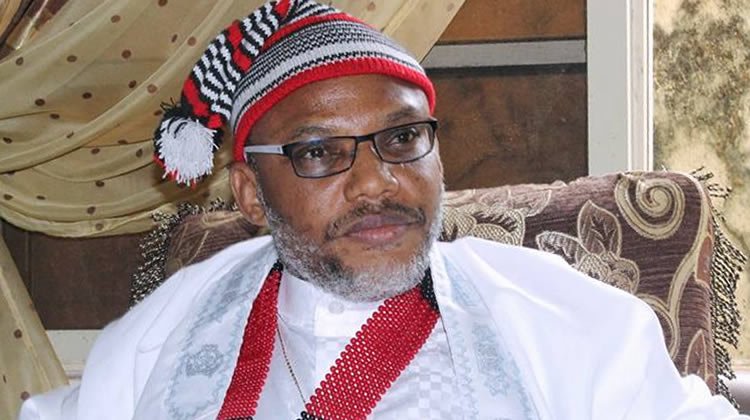Kanu seeks to stop FG’s trial, heads to the Appeal Court

The Indigenous People of Biafra’s (IPOB) leader, Nnamdi Kanu has asked the Appeal Court to stop his trial. His Lead Counsel, Aloy Ejimakor, filed the appeal.
Kanu is against being tried by the Abuja Federal High Court, led by Justice Binta Nyako. A few weeks ago, Ejimakor said that the court does not have the authority to hear the charges against Kanu.
The Nigerian Government is prosecuting the IPOB leader on terrorism related charges.
In the application filed by Ejimakor at the Court of Appeal, Ejimakor argued, “The Appellant (Nnamdi Kanu) filed this appeal against the Ruling of the Federal High Court, Abuja Division coram: B.F.M Nyako, J. delivered on the 19th March, 2024.
“The said Ruling of the trial court is contained at Pages 42 – 43 of the Record of Appeal; and the Notice of Appeal is at Pages 44-49 of the said Record. The Record of Appeal was transmitted to this Honourable Court on the 16th day of May, 2024. There are three grounds in the Notice of Appeal and the issues argued herein have been distilled from the said three grounds.
“My Lords, Appellant has been in pre-trial detention since June 2021 at the Headquarters of the State Security Services (SSS) in Abuja; and he is currently on trial on a seven-count Charge, some of which are capital offenses punishable by death. On 19th February 2024, the Appellant filed a ‘Notice of Preliminary Objection’ to the jurisdiction of the trial court, pursuant to Section 36(6) (b) and (c) of the Constitution of the Federal Republic of Nigeria, 1999 (as amended) and under the inherent jurisdiction of the trial court. The said Notice of Preliminary Objection was supported by an Affidavit, three Exhibits and a Written Address; and it was brought on the following grounds (See Pages 3 – 24 of the Record of Appeal):
“The Respondent’s act of forcible seizure and photocopying of confidential legal documents brought to the Appellant at the Respondent’s detention facility by his Lawyers, said documents pertaining to facilitating the preparation of Appellant’s defence, amounts to denial of Appellant’s constitutional right to be given adequate facilities for the preparation of his defence and to be defended by legal practitioners of his own choice and is thus a grave violation of Appellant’s constitutional right to Fair Hearing as guaranteed under Section 36(6)(b) & (c)of the Constitution of Federal Republic of Nigeria, 1999 (as amended).
“The Respondent’s act of refusing or preventing the Appellant’s Counsel from taking notes of details of Counsel’s professional and confidential discussions/consultations with the Appellant (at Respondent’s detention facility), said discussions/consultations relating to facilitating preparation of Appellant’s defence amounts to denial of Appellant’s right to be given adequate facilities for the preparation of his defence and by legal practitioners of his own choice and is thus an egregious violation of Appellant’s constitutional right to Fair Hearing as guaranteed under Section 36(6)(b) & (c) of the Constitution of Federal Republic of Nigeria, 1999 (as amended).
“The Respondent’s act of eavesdropping on the Appellant’s confidential consultations/conversations with his Lawyers on matters relating to preparation of Appellant’s defense during the Lawyers’ visitations with the Appellant amounts to denial of Appellant’s right to be given adequate facilities for the preparation of his defence and to be defended by legal practitioners of his own choice and is thus an egregious violation of Appellant’s constitutional right to Fair Hearing as guaranteed under Section 36(6)(b) & (c) of the Constitution of Federal Republic of Nigeria, 1999 (as amended).”
The leader of the Indigenous People of Biafra, IPOB, Nnamdi Kanu, has filed an application at the Appeal Court to stop his trial.
In the appeal filed through his Lead Counsel, Aloy Ejimakor, Kanu kicked against his trial by an Abuja Federal High Court presided by Justice Binta Nyako.
A few weeks ago, Ejimakor had declared that the court lacked the jurisdiction to entertain charges against Kanu.
The Nigerian Government is prosecuting the IPOB leader on terrorism related charges.
In the application filed by Ejimakor at the Court of Appeal, Ejimakor argued, “The Appellant (Nnamdi Kanu) filed this appeal against the Ruling of the Federal High Court, Abuja Division coram: B.F.M Nyako, J. delivered on the 19th March, 2024.
“The said Ruling of the trial court is contained at Pages 42 – 43 of the Record of Appeal; and the Notice of Appeal is at Pages 44-49 of the said Record. The Record of Appeal was transmitted to this Honourable Court on the 16th day of May, 2024. There are three grounds in the Notice of Appeal and the issues argued herein have been distilled from the said three grounds.
“My Lords, Appellant has been in pre-trial detention since June 2021 at the Headquarters of the State Security Services (SSS) in Abuja; and he is currently on trial on a seven-count Charge, some of which are capital offenses punishable by death. On 19th February 2024, the Appellant filed a ‘Notice of Preliminary Objection’ to the jurisdiction of the trial court, pursuant to Section 36(6) (b) and (c) of the Constitution of the Federal Republic of Nigeria, 1999 (as amended) and under the inherent jurisdiction of the trial court. The said Notice of Preliminary Objection was supported by an Affidavit, three Exhibits and a Written Address; and it was brought on the following grounds (See Pages 3 – 24 of the Record of Appeal):
“The Respondent’s act of forcible seizure and photocopying of confidential legal documents brought to the Appellant at the Respondent’s detention facility by his Lawyers, said documents pertaining to facilitating the preparation of Appellant’s defence, amounts to denial of Appellant’s constitutional right to be given adequate facilities for the preparation of his defence and to be defended by legal practitioners of his own choice and is thus a grave violation of Appellant’s constitutional right to Fair Hearing as guaranteed under Section 36(6)(b) & (c)of the Constitution of Federal Republic of Nigeria, 1999 (as amended).
“The Respondent’s act of refusing or preventing the Appellant’s Counsel from taking notes of details of Counsel’s professional and confidential discussions/consultations with the Appellant (at Respondent’s detention facility), said discussions/consultations relating to facilitating preparation of Appellant’s defence amounts to denial of Appellant’s right to be given adequate facilities for the preparation of his defence and by legal practitioners of his own choice and is thus an egregious violation of Appellant’s constitutional right to Fair Hearing as guaranteed under Section 36(6)(b) & (c) of the Constitution of Federal Republic of Nigeria, 1999 (as amended).
“The Respondent’s act of eavesdropping on the Appellant’s confidential consultations/conversations with his Lawyers on matters relating to preparation of Appellant’s defense during the Lawyers’ visitations with the Appellant amounts to denial of Appellant’s right to be given adequate facilities for the preparation of his defence and to be defended by legal practitioners of his own choice and is thus an egregious violation of Appellant’s constitutional right to Fair Hearing as guaranteed under Section 36(6)(b) & (c) of the Constitution of Federal Republic of Nigeria, 1999 (as amended).”
Ejimakor also raised some questions for the court to determine, including:
“Was the Learned trial court right to have assumed jurisdiction to proceed with the trial of the Appellant when the Appellant is glaringly denied the constitutional right to fair trial with particular reference to denial of the adequate facilities to prepare for the defence of the criminal allegations against the Appellant and his right to counsel of his own choice? (Distilled from Ground One of the Notice of Appeal).
“Was the learned trial Judge right in law to have failed to properly evaluate the evidence (particularly the Appellant’s uncontroverted evidence) which failure thus led the trial Court to hold that “I cannot make orders directing a security agency on how to do their work. I can only direct that whatever is within the law must be allowed to the Defendant. Counsel cannot direct the court or give condition to the court on how to conduct its business. The Defendant is entitled to a counsel of his choice and should be given the facility to conduct interview with his counsel within the confines of the law?”(Distilled from Ground Two of the Notice of Appeal).





